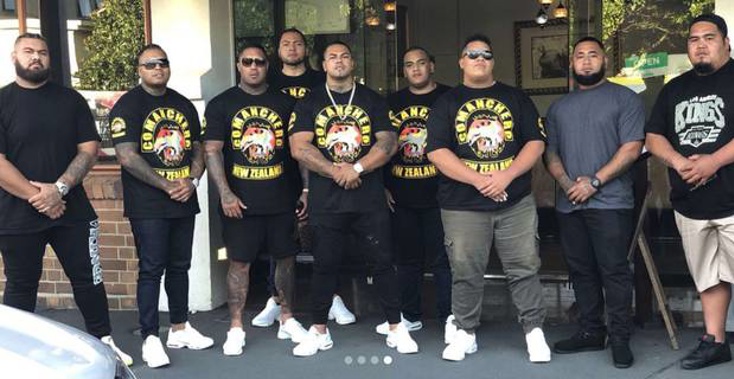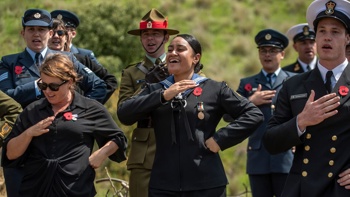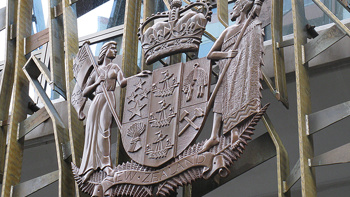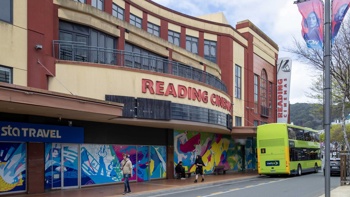
Financial analysts and cyber-crime specialists among the new staff to crack down on trans-national organised crime in New Zealand.
When Mike Bush joined the police in 1978, organised crime in New Zealand was small time.
Those making money from crime lived locally. The illicit commodity they sold was sourced locally. Their networks and customers were locals, too.
Then the world changed. People began to travel more frequently, international trade became easier.
The most entrepreneurial Kiwi criminals - think the Mr Asia syndicate - looked overseas.
They established contacts in other countries to source illegal products and develop smuggling routes into New Zealand.
Organised crime was still a local business, with homegrown directors and shareholders, but now importing skills and goods from overseas.
Then the world changed again.
Methamphetamine exploded into New Zealand in the early 2000s and gangs that had international connections, like the Head Hunters and Hells Angels, dominated the market. Millions of dollars were made and the profits were huge.
This put New Zealand on the world map. Instead of local criminals reaching out, international criminals are now reaching in.
Even in the past decade, greater travel, trade and technology means it's easier than ever for criminals to do business here.
Forty years after he joined the police, Commissioner Mike Bush says organised crime has morphed from a local shop to a multinational corporation.
"That's the evolution of organised crime. This is a global business now," Bush told the Herald on Sunday.
"And it's a threat to our national security. The impact is that significant.
/arc-anglerfish-syd-prod-nzme.s3.amazonaws.com/public/I5Z55JZMLZC6BGMT55JL4L4R2E.jpg)
MAKING MONEY is the reason organised crime exists.
Drugs, particularly methamphetamine, make the most money here and are the illicit commodity of choice.
The personal cost of drug use, as well as the harm to friends and family of addicts, is estimated to be nearly $1.1 billion each year, according to the New Zealand Drug Harm Index.
Fraud, tax evasion, money laundering, human trafficking and the theft of power tools, car parts, firearms, even exotic animals, are also profit-driven crimes in New Zealand.
These enterprises range from unsophisticated and local to complex international syndicates that employ specialists to move money and hide their tracks.
"As groups become more sophisticated, they contract specialist skills to access the hidden international financial, logistics and digital infrastructures," said one briefing to new Police Minister Stuart Nash.
"Police are increasingly seeing the use of international money laundering facilitators and information technology expertise in organised crime."
Of "significant concern", according to the briefing released under the Official Information Act, is these Trans-National Organised Crime [TNOC] groups working alongside New Zealand Adult Gangs [NZAG] more often.
Rubbing shoulders with more sophisticated criminals is leading New Zealand gangs to be more "aspiring".
Gangs from New Zealand and Australia are infiltrating the Pacific Islands - where many members have family ties - which gives them access to shipping routes for drug trafficking.
Of even greater concern is the deportation of senior gang leaders from Australia to New Zealand.
This was "injecting an increased level of sophistication and capability to NZAG as they bring established links to international gangs and other organised crime networks", Assistant Commissioner Richard Chambers wrote to Nash.
In February, the Herald on Sunday revealed the Comancheros gang had officially opened a chapter in New Zealand.
Fourteen patched members were deported here, including Pasilika Naufahu, who was a senior member of a Sydney chapter.
"Like the other Australian gangs, the Rebels and the Bandidos, we expect the Comancheros will attempt to establish themselves in the drug market in New Zealand," Detective Superintendent Greg Williams said at the time.
"And there is friction when gangs try to move into an established drug market. So there may be [violence] that comes out of this."
Of all homicides since January 2016, the police say gang members - or 0.1 per cent of the population - have been identified in 12.9 per cent of all charges laid.
Many of these deaths, the result of inter-gang rivalries or underground intimidation, take dozens of detectives months to solve.
"We need to get ahead of the curve by targeting senior organised crime figures, rather directing significant resource into other serious crimes - like homicides - that flow from organised crime," says Mike Bush.
Another problem highlighted in the briefing to Nash was the "opaque" ownership of New Zealand companies and trusts, as highlighted by the Panama Papers.
"New Zealand companies and trusts are regularly involved in the kinds of international criminal networks often facilitated by professional firms that are either unwittingly or knowingly facilitating complex company and trust structures and transactions."
Each year, about 100 international enquiries are made with the police Financial Intelligence Unit (FIU) about serious criminal activity happening through New Zealand companies and trusts.
"The FIU is often not able to provide information to other countries' law enforcement agencies on the person who makes the controlling decisions for these New Zealand entities."
Similarly, New Zealand investigators are regularly dealing with international cases involving trusts, companies and bank accounts which have been set up by "professional facilitators".
This allows criminals to anonymously and untraceably access money.
And although the paper trail is difficult to track in the legitimate banking world so, too, are the digital footprints of crypto-currency, the Dark Web and encrypted communications.
To be successful in targeting global organised crime, in particular the financial "controller networks", the briefing warned police could not solely focus on our own backyard.
Police need to work more closely with intelligence agencies inside New Zealand, the SIS and GCSB, as well as international partners like Five Eyes.
"We've had to change our approach to be a more international police force," says Bush.
"Our aim is to keep the harm offshore."
And the harm for is still very real.
NEW ZEALAND is still in the grip of methamphetamine, nearly 20 years after P became the drug of choice.
Bush noted a recent investigation in Kawerau Operation Notus, which targeted the local Mongrel Mob chapter and led to 40 arrests.
About 2.4kg of methamphetamine was allegedly distributed over a six-month period - relatively modest in comparison to some of the 100kg shipments stopped at the border in recent years.
Bush pointed out the relative harm to the size of the community.
"We've learned a lot about the damage to small towns - the poverty, the dysfunction. It's taking food out of the mouths of children, clothes off their backs," says Bush.
"We don't understand the issue until after enforcing the law, but that's around the wrong way. We're determined to work with the community, health, NGOs, iwi, to deal with this holistically.
"Pure enforcement won't resolve what is a serious social issue. More resourcing is required, especially around addiction services."
Given the growing complexity and seriousness of organised crime in the past decade, the briefing to the new Minister ends with an "opportunity".
More dedicated staff, please.
They had a sympathetic ear in Nash.
When in Opposition, the Labour MP campaigned with tough rhetoric on gangs - as did NZ First's Shane Jones.
When it came to striking a deal after the election last year, the coalition agreement to form a new government has the goal: "Strive towards adding 1800 new police officers and commit to a serious focus on combating organised crime and drugs."
In this week's Budget announcement, Nash announced 1100 new staff would be funded for community policing, with another 700 dedicated to organised crime.
Some will not be sworn police officers but "authorised officers" - specialists in forensic accounting, or cybercrime, to follow the money or digital trails.
In a pre-Budget skirmish with Nash, National's police spokesman Chris Bishop questioned whether "authorised officers" were what the public had in mind when Labour promised 1800 new police officers.
/arc-anglerfish-syd-prod-nzme.s3.amazonaws.com/public/QGYNXSJF2FDI7AEKJMHVAB3XH4.jpg)
Police talk to senior Head Hunters president Wayne Doyle when seizing $6 million of assets. (Photo/NZ Herald)
Even the Police Association said it would keep a watchful eye on authorised officers in terms of the type of work they will do, and where they will be located.
"While we have some misgivings about the allocation of 700 (40 per cent) of the new officers to organised crime, we hope any concerns about such a commitment to organised crime will be satisfied when the deployment details are released.
"The Association is only too well aware that the tentacles of methamphetamine have spread throughout the country," says vice-president Craig Tickelpenny.
"Meth and gangs are intrinsically linked and increasingly implicated in our rising crime rate - serious and organised crime in particular."
But those concerns are downplayed by the Minister in a pre-Budget interview with the Herald on Sunday this week.
"When we talk about frontline policing, it's not just men and women in blue on the street," says Nash.
"It's individuals with specialist skills to go after these guys [organised crime]. This is the changing nature of 21st century crime fighting.
"We need to move with the times. In fact, we need to get ahead of the curve."
The existing Asset Recovery Units, which have restrained around $250 million of criminal assets in the past five years, will undoubtedly see a heavy investment. For every $1 spent, police estimate a return of $5.
The Criminal Proceeds Recovery Act, which came into force in 2009, essentially forces someone to prove how an asset was paid for.
These cases are determined by the civil level of proof, the "balance of probabilities", rather than the much higher criminal evidential threshold of "beyond reasonable doubt".
Sometimes the criminal and civil cases taken by police progress through the courts in tandem.
No criminal conviction is needed for the civil case to be successful.
In some cases, like the current action against Head Hunter president Wayne Doyle, no criminal charges are even laid.
Boosting the resources of the ARU, overseen nationally by Detective Inspector Craig Hamilton, is a key strategy of the police.
"The purpose of organised crime is to turn a profit," says Mike Bush.
"If you're in custody, but still have assets, you're still influential. So in terms of senior figures, you've got to do both. That's how you dismantle organised crime. You do both at once."
/arc-anglerfish-syd-prod-nzme.s3.amazonaws.com/public/AG7NUOFVOJEGFNAKT52XKKE36Y.jpg)
Millions of dollars in cash seized during Operation Genoa. (Photo/Richard Robinson)
AS WELL as targeting assets of senior leadership, Nash hinted at changes to the Crimes Act in regards to the offence of participating in an organised criminal group.
The charge has been largely ineffective. Nash says police need the ability to target individuals who are pulling the strings from afar.
"It's a cliche but we need to cut the head off the snake."
Nash promised more staff for dedicated organised crime squads in each police district.
With teams in Auckland, Wellington and more recently Tauranga, the National Organised Crime Group - which reports to Police National Headquarters - has had success in major covert operations.
But organised crime squads in the police districts - reporting to the district commander - have often been woefully under-resourced.
Staff from these teams are often the first to be redeployed whenever a major crime, like a homicide, needs to be solved.
The organised crime unit in the Eastern police district, which stretches from Hicks Bay on the top of the East Cape down to Napier where Nash lives, has four staff.
"You're not going to be able to go after gang leaders with four staff. Imagine what you can do with 40, or even 20," says Nash.
These new staff in the regions will be ring-fenced to focus solely on organised crime, he says.
"What we don't want is district commanders saying, 'Hell, we're short on this' so we're going to pull guys off organised crime."
But with 1800 new police staff coming, many with a focus on unearthing crime hidden by its very nature, more arrests could undermine Labour's goal to cut the prison population by 30 per cent over the next 15 years.
Nash says he is working closely with Justice Minister Andrew Little and Corrections Minister Kelvin Davis.
/arc-anglerfish-syd-prod-nzme.s3.amazonaws.com/public/RJLPSRWUUZCUDOMZHR65I6DLME.jpg)
Firearms seized during investigation into Head Hunters Operation Genoa. (Photo/Richard Robinson)
Fundamentally, he believes both goals can be achieved by being tough on those making money from drugs - but showing compassion to those at the other end of the supply chain.
One "alternative resolution" is community justice panels where a plan is made with offenders to address what is driving their criminal behaviour, such as addiction or unemployment.
Instead of prison, they get help.
"We've got some good people who find themselves in bad situations. Gone are the days when we lock people up and ask questions later," says Nash.
"Prison is expensive fiscally and socially. We've got to understand how people within the community got themselves into such a dire situation. And address that in a way that doesn't stigmatise them for the rest of their lives, but instead allows them to get back into community in a meaningful way."
Take your Radio, Podcasts and Music with you

/arc-anglerfish-syd-prod-nzme.s3.amazonaws.com/public/U5EOSHLONZCQBLNTTMVRYHWOGQ.jpg?width=438&height=395)








